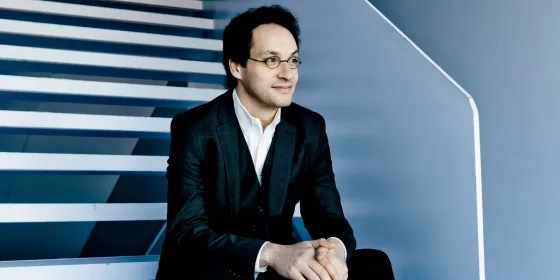Pianist Shai Wosner on the Keys to Success
News StoryAward winning Opus 3 Artist Shai Wosner comes to SFCM with a performance and Masterclass. Ahead of his stage time he shared what got him started on the piano, what he was obsessed with growing up, and his take on the future of music.
By Mark Taylor
A piano is for playing, and making sure you’re enjoying yourself while working with your musical instrument is just one lesson award winning Opus 3 Artist Shai Wosner has for aspiring musicians. At SFCM the professional pianist will be giving a Masterclass on October 11th, and a special performance for the first annual Chamber Music Tuesday, on October 12th. During his stay at SFCM he took some time to answer some of our burning questions.
How did you start playing piano?
We have a piano at home which I was really intrigued by, even though no one was playing it. I started 'teaching' myself how to play it by picking out cheesy tunes on the radio (all in A minor for some reason). That led my parents to have me take piano lessons. I became obsessed with Mozart when they took me to see 'Amadeus', an obsession for which I am very grateful. But I am most grateful that my parents saw how important this was to me and made it available.
What music influenced you growing up?
I was listening primarily to opera and orchestral music - it was a guilty pleasure because I thought I was supposed to listen to piano music. But in hindsight I realized that it was actually a useful thing to do because so much of piano music is about pretending the percussion instrument you are playing is something else - a string quartet, an opera singer or a symphony orchestra.
How are you feeling about the return to live performances?
It may be old-fashioned but I really do believe that the music we play was ultimately meant to be shared in person so it's just so wonderful to be able to do this again.
As a successfully working pianist with Opus 3 what is your advice for aspiring musicians?
It may sound cliché but the most important thing is to find out who you are as an artist - what kind of repertoire you 'are', what kind of sound you are really looking for, what kind of collaborations you genuinely want to pursue artistically - some people are lucky to have those figured out when they are 19, others when they are 30, but it's important to strive for that feeling of artistic assuredness. That is perhaps the most important aspect of life as an artist but a close second is figuring out how to make things work, how to get along with people in your field, how to navigate it, how to bring about the projects that you believe in. A lot of it is a matter of personality and just like talent, it may come more naturally to some than to others. But it's important to realize that it is a very significant part of our life and it requires its own set of skills and experience.
What is currently on your music playlist?
I have been listening to a lot of Kurtág because I am putting together a mini-festival at Bard College connecting his music to other composers. But the truth is, these days I would like to listen to music more regularly. I try to tell this to all the students I meet. Listen to music! A ton of music, not just for your instrument, not just excerpts, cover as much repertoire as you can. Before job/kids/both! Now is the time!
What are you most excited for in the future of music and music performance?
I think our artform is changing in fascinating ways - many changes are welcome, such as the call for more diversity and the general openness that seems to become more common. Some changes are out of necessity - the changing venues and concert formats. I am very curious to see where things go because a lot of what now seems like superhuman miracles in music history was actually the result of adapting to mundane circumstances - Mozart wrote the great piano concertos because he had to make money somehow when the emperor closed down opera houses.
What should every pianist or young musician know about a life in music?
Audiences out there appreciate what you do more than you realize, if you can only get to them! What you do in your interpretation of a piece - gestures, contrasts - often only sound half as clear to the listener than they do in your head, and as long as it's genuine and does not seem mannered, audiences are very strongly drawn to artists who appear to enjoy what they are doing.
Learn more about studying Piano at SFCM.
